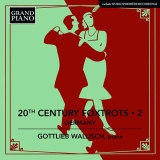 20th Century Foxtrots 2; Hindemith: Tanz der Holzpuppen aus Tuttifäntchen; Bornschein: Blues; Künneke: Batavia Fox-Trot aus Der Vetter aus Dingsda; d'Albert: Blues; Erdmann: Foxtrot C-Dur; Gieseking: 3 Tanz-Improvisationen; Finke: Shimmy; Butting: Tango Nr. 14; Mittmann: Konzert-Jazz-Suite; Herbst: Jazz-Etüde; Sekles: Kleiner Shimmy; Niemann: Moderne Tanzsuite op. 115; Wolpe; Rag-Caprice; + Tango; Weill: Tango-Ballade aus Die Dreigroschenoper + 2 Stücke aus Marie Galante; Goehr: 2 Stücke aus David Golder; Borris: Quick-Fox + Tango; Gottlieb Wallisch, Klavier; 1 CD Grand Piano GP 814; Aufnahme 10/2019, Veröffentlichung 11/2020 (66’28) - Rezension von Guy Engels
20th Century Foxtrots 2; Hindemith: Tanz der Holzpuppen aus Tuttifäntchen; Bornschein: Blues; Künneke: Batavia Fox-Trot aus Der Vetter aus Dingsda; d'Albert: Blues; Erdmann: Foxtrot C-Dur; Gieseking: 3 Tanz-Improvisationen; Finke: Shimmy; Butting: Tango Nr. 14; Mittmann: Konzert-Jazz-Suite; Herbst: Jazz-Etüde; Sekles: Kleiner Shimmy; Niemann: Moderne Tanzsuite op. 115; Wolpe; Rag-Caprice; + Tango; Weill: Tango-Ballade aus Die Dreigroschenoper + 2 Stücke aus Marie Galante; Goehr: 2 Stücke aus David Golder; Borris: Quick-Fox + Tango; Gottlieb Wallisch, Klavier; 1 CD Grand Piano GP 814; Aufnahme 10/2019, Veröffentlichung 11/2020 (66’28) - Rezension von Guy Engels
Nach seinem musikalischen Abstecher in die ehemalige Donau-Monarchie, richtet Gottlieb Wallisch in seiner zweiten Aufnahme aus der Reihe 20th Century Foxtrots den Blick auf die Weimarer Republik und die vermeintlich Goldenen Zwanzigerjahre.
Mit dem Eintritt der USA in den Ersten Weltkrieg kam neue Musik nach Europa – der Jazz mit all seinen Varianten und Tanzstilen. Im kriegsmüden Europa war gerade diese beschwingte, schwerelose Musik ein geeignetes Mittel, sich die Welt schön zu tanzen.
Komponisten wie Paul Hindemith, Eugen d’Albert, Kurt Weill konnten sich der Faszination dieser Musik, die frei von allen Formen schien, nicht zu entziehen. Frei und unbeeindruckt vom Standard-Foxtrott, wie er noch in Tanzschulen gelehrt wird, bewegt sich auch Gottlieb Wallisch auf dem Klavier.
Seine Interpretationen sind der klingende Spiegel einer bewegten, wilden Zeit zwischen zwei Weltkriegen. Gottlieb Wallisch spielt mit genüsslichem jazzy Drive, ohne plakativ zu wirken.
After his musical excursion to the former Danube monarchy, Gottlieb Wallisch turns the focus to the Weimar Republic and the supposedly Golden Twenties. With the entry of the USA into the First World War, new music came to Europe – jazz with all its variations and dance styles. In war-weary Europe, this lively, weightless music was a suitable means of making the world better.
Composers like Paul Hindemith, Eugen d’Albert and Kurt Weill could not escape the fascination of this music, which seemed free of all forms. Gottlieb Wallisch’s playing is also very free and flexible.
His interpretations are the sounding mirror of a turbulent, wild time between two World Wars. Gottlieb Wallisch jazzy playing has a pleasurable drive, without appearing to be striking.
























